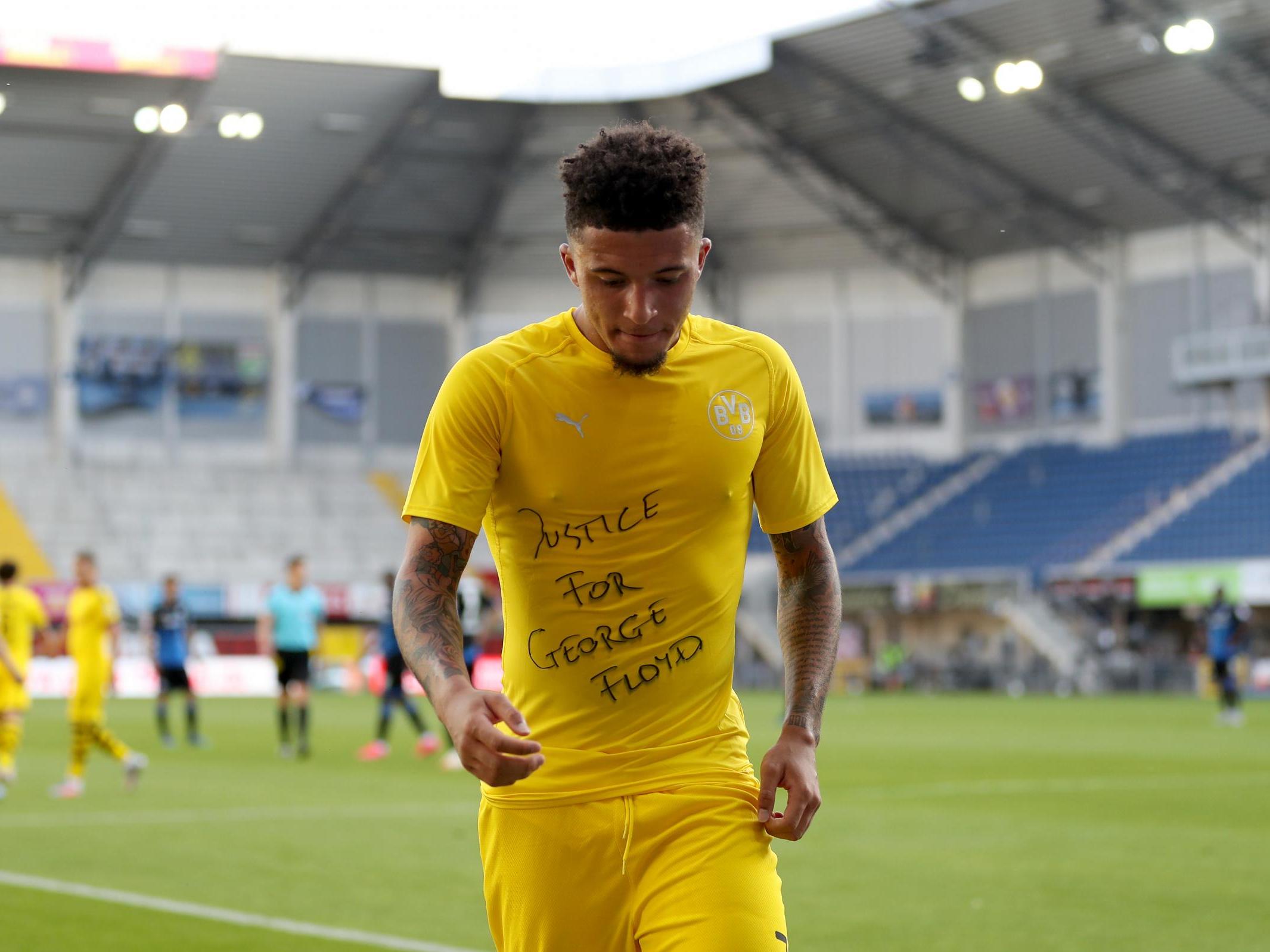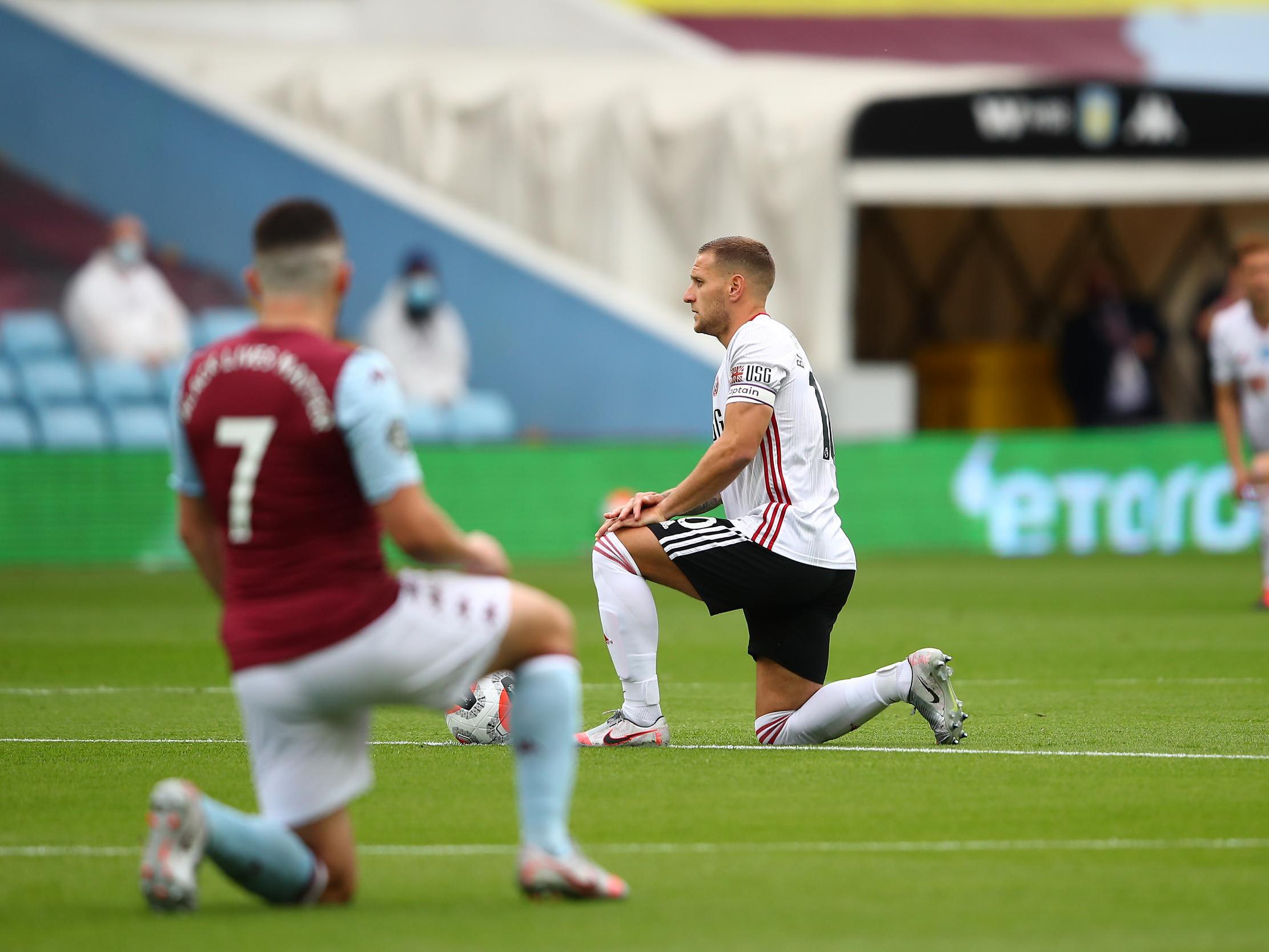Welcome to the new normal: Taking a knee and taking a stand, Premier League players won’t be muted
Forget games behind closed doors, artificial crowd noise and such, the momentous difference in the Premier League’s new normal is the empowerment of its players.

Your support helps us to tell the story
From reproductive rights to climate change to Big Tech, The Independent is on the ground when the story is developing. Whether it's investigating the financials of Elon Musk's pro-Trump PAC or producing our latest documentary, 'The A Word', which shines a light on the American women fighting for reproductive rights, we know how important it is to parse out the facts from the messaging.
At such a critical moment in US history, we need reporters on the ground. Your donation allows us to keep sending journalists to speak to both sides of the story.
The Independent is trusted by Americans across the entire political spectrum. And unlike many other quality news outlets, we choose not to lock Americans out of our reporting and analysis with paywalls. We believe quality journalism should be available to everyone, paid for by those who can afford it.
Your support makes all the difference.During what has been the most seismic disruption in football’s history has come the most significant change.
Forget games behind closed doors, artificial crowd noise, significant occlusions, five substitutions and such – the momentous difference in the Premier League’s new normal is the empowerment of its players.
England’s top flight returned, but not like we know it. When the first whistle of Project Restart sounded – with the world tuned in – the starting 11 of Aston Villa and Sheffield United took a knee along with referee Michael Oliver. The symbolic act, a show of support for the Black Lives Matters movement, lasted nine seconds.
It was mirrored in the late kick off at the Etihad, with Manchester City and Arsenal following suit and Pierre-Emerick Aubameyang also raising his fist through it.
The imagery was powerful, as was the timing of it given the global audience, but so too was the detail.
Each second represented a minute that George Floyd, an unarmed African American man, spent on the ground as he was murdered by Minneapolis police.
White officer Derek Chauvin placed his knee on the right side of the father of five’s neck for eight minutes and 46 seconds.
It restricted blood flow to Floyd’s brain and impeded his breathing as he lost his life while a camera phone rolled to capture it, leading to universal protests of incredible scale and potency.
Football has historically kept far greater than a two-metre distance from such social and political issues, but not anymore.
The players have discovered their voice, pressing the game into listening. The fear of speaking up has been replaced by fierce courage.
The surnames on the back of their shirts has been replaced by Black Lives Matter.
Handshakes have been replaced by the taking of a knee. Anti-racist messaging will feature on under garments.
Goals can take on a greater meaning, because as Jadon Sancho, Marcus Thuram and others illustrated in the Bundesliga, it invites a powerful moment to transcend football.
Players have realised the power of their platforms, with Marcus Rashford underscoring the limitlessness of their potential to push for consequential change.

In five days, the Manchester United striker went from tweeting an enquiry over who he could speak to in government about the food voucher system to forcing them to reverse their decision to end free school meal coupons next month.
His passion, persistence and effective action will ensure 1.3 million children do not go hungry this summer.
This is not performative, it’s game-changing: Rashford is tackling child poverty, Raheem Sterling has challenged the English game to cure its lack of representation in boardrooms and the dugout, Jordan Henderson was the driving force behind the #PlayersTogether initiative, Hector Bellerin, Seamus Coleman and Troy Deeney led talks to back the Black Lives Matter movement.
That’s only a tiny look.
That we got to this point – past empty slogans, PR campaigns only designed for appeasement and the indoctrinated culture of ‘stick to football’ – is extraordinary.
Questions are being asked of the government. Questions are being asked of the sport.
Players are finally shouting about the things they care about – proudly and without apprehension.
The Premier League have been forced to hear them, forced to let them express themselves, forced to learn, forced to act.
This was also the case in the Bundesliga, where brave young men making a stand prompted Fifa to issue the directive that anti-racism protests cannot be punished.

The system never automatically alters, it has to be given no other option – it has to be told what is right, in explicit terms, by its biggest assets.
This is not exclusive to football. In the NBA, the activism of LeBron James, Dwyane Wade, Kyrie Irving and the late Kobe Bryant – to name a few – compelled the league to be more open and involved in shunning discrimination and promoting meaningful transformation.
The NFL has had to follow.
In September 2016, Colin Kaepernick protested police brutality against black Americans by taking a knee during the national anthem. “I am not going to stand up to show pride in a flag for a country that oppresses black people and people of colour,” he said a day later.
“To me, this is bigger than football, and it would be selfish on my part to look the other way. There are bodies in the street and people getting paid leave and getting away with murder.”
He was ostracised, playing his final NFL game four months later. On 5 June, when commissioner Roger Goddell admitted the league were wrong “in silencing our players from peacefully protesting,” he failed to mention the former San Francisco 49ers quarterback during his one minute and 21 second statement.
The NFL, he insisted, will do better. Good, because it has to.
Lewis Hamilton, meanwhile, is still steering Formula One in the right direction. He slammed fellow drivers for staying silent on the issue of black lives being routinely looted, leading several like Daniel Ricciardo, Charles Leclerc and Lando Norris to belatedly speak out.
Being voiceless was the status quo.
“I have spoken so little about my personal experiences because I was taught to keep it in,” Hamilton admitted. “Don’t show weakness, kill them with love and beat them on the track.
“This is why I drive the way I do, it is far deeper than just doing a sport, I’m still fighting.
“Equality is paramount to our future, we cannot stop fighting this fight. I for one, will never give up!”
When the statue of slave trader Edward Colston was removed by demonstrators in Bristol, the six-time world champion wrote: “I do not condone violence of criminal acts but you have had plenty of time to do this yourselves and haven’t. Power to the people.”
Hamilton then urged governments around the world to “implement the peaceful removal of these racist symbols.”
More than ever, sports stars are plugged into the bigger social picture, compelling their organisations to also take a deeper look.
They are now fully aware of what they’re capable of, which can no longer be muted.
Welcome to the new normal. It’s been a long time coming.
Join our commenting forum
Join thought-provoking conversations, follow other Independent readers and see their replies
Comments